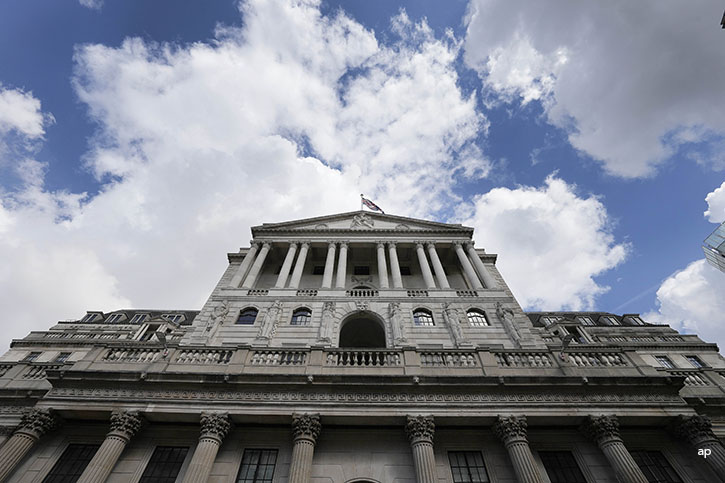
The fourth quarter of 2024 is going to be an eventful period for the UK economy, with some key dates coming up for investors in UK government bonds in particular. While the Oct. 30 Budget will provide the political drama, there are also two Bank of England meetings before the end of the year.
Starting with monetary policy, August saw the first interest rate cut in four years, but policymakers made it clear that there is no fixed path to monetary easing. Rates were held in September amid talk by the Bank of a “gradual approach” to cutting rates and sticky core inflation. With October “skipped” as a meeting month, investors and mortgage holders are now focusing on the Nov. 7 meeting, with money markets pricing in a 0.25 percentage point cut, taking key rates to 4.75%. In an interview published on Oct. 3, Bank governor Andrew Bailey floated the idea of bigger rate cuts in the coming months if inflation continued on the same path.
Key Q4 Dates for Inflation, Interest Rates and More
• Oct. 7, 14, 21: Bank of England bond sales
• Oct. 16: September inflation data
• Oct. 30: Autumn Budget
• Nov. 7: Bank of England monetary policy meeting
• Nov. 20: October inflation data
• Dec. 18: UK inflation data for November
• Dec. 19: Bank of England monetary policy meeting (last of the year)
• Dec. 20: Next schedule for Q1 2025 gilt sales released
UK inflation hit the 2% target this year but has nudged up to 2.2%, and September’s print comes out on Oct. 16, ahead of the Budget and the Bank’s meeting. There’s no consensus yet for September’s data, but recent shop price inflation figures have been encouraging those looking for signs of inflation abating. In the eurozone, inflation has just undershot target, potentially setting up an October rate cut, a move unexpected a month ago.
What Changes Could the Budget Bring?
Moving on to fiscal policy, Morningstar.co.uk has looked in detail at potential tax changes in the October Budget:
• Inheritance Tax • Capital Gains Tax • Pension Rules
More Tax Pain Ahead?
Savers and investors have been braced for a painful first Labour Budget by the chancellor and prime minister. Newly elected politicians, with a large majority, have a rare opportunity to “kitchen sink” the bad news because they don’t face the electorate for a few years.
This is not a risk-free approach, as talk of entrepreneurs in the media fleeing the UK shows. There are signs that the government is aware it may have overdone the initial messaging, realizing it has to come up with a better mission statement than “you will have to pay more taxes”. It’s not like an upbeat party conference speech, but the Budget has to involve some positivity, at least for those who voted Labour. The gloomy build-up could also have been a political masterstroke if the chancellor is then able to unveil a better-than-expected package of measures (or at least not as bad as expected).
“The backlash against Reeves’ initial doom and gloom message means that we may get a few hints on Budget sweeteners that may be coming our way to counteract some of the initial sourness in her message,” said Kathleen Brooks, research director at XTB, in a note on Oct. 3.
Read More Bond Investing Content:
• Buying Bonds for Income • How Top Bond Managers Are Playing the Rate Cut • Want to Buy Government Bonds? Read This
Bond Markets Will be Vigilant
Memories of the 2022 “mini-Budget” may be fading, but bond markets will be closely watching the new chancellor’s next moves. Labour will want to avoid a Truss/Kwarteng repeat, when government bond yields spiked, the pound almost hit parity against the dollar, and the Bank of England had to rescue pension funds. Still, it will be worth monitoring the movements of UK government bond markets to see if Labour “got it right” in the balance between prudence, spending plans and careful tax messaging.
As well as setting interest rates this quarter, the Bank of England is also selling off its stock of government debt in a process known as quantitative tightening. The Bank is selling off £2.15 billion of UK government debt of varying maturities on three consecutive weeks in October. This is part of the £100 billion reduction in the Bank’s stock of UK gilts, which is just over £650 billion. Recall that the Bank held nearly £900 billion of UK government debt at the peak following years of quantitative easing.
Currently the two- and 10-year gilts yield around 4%, which is above the current rate of inflation.
The author or authors do not own shares in any securities mentioned in this article. Find out about Morningstar's editorial policies.
























